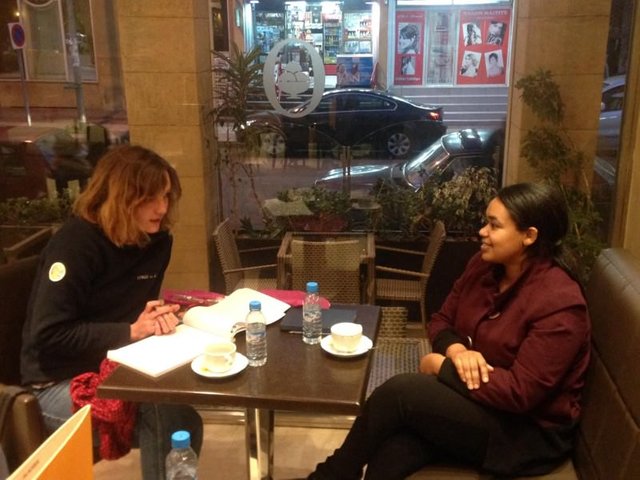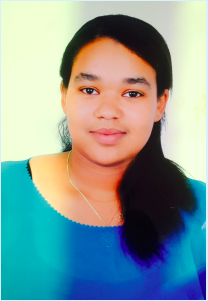[MOROCCO] Kaoutar, a low-cost water purification filter
During our visit to Casablanca, we met Kaoutar Abbahaddou, a young entrepreneur who is a model, hyper-active and optimistic while remaining full of realism. A meeting rich in lessons for us and all the young entrepreneurs!

Kaoutar Abbahaddou , a 23-year-old Moroccan engineer, launched the Vernet Access Water project 3 years ago , developing a low-cost water purification filter . In just a few years, the project and its development strategy have evolved considerably to succeed in bringing together low-tech and entrepreneurship. Lessons!

Kaoutar remembers this day, just after entering engineering school ( Mohammedia School of Engineers of Rabat , one of the most prestigious in the country) where all the students found themselves in the courtyard, lined up well in a row, in costume military. "What is my difference? What is my mission, Kaoutar, here? "To answer these exitential questions and find his professional path, Kaoutar is deeply involved in many extracurricular activities and volunteering. Finally, it is social entrepreneurship that holds its attention ie the creation of innovative and sustainable companies whose products or processes can respond to major social and / or environmental challenges. With comrades, they enjoy the competitionEnactus International to think about a product-solution ... They identify several essential needs but it is access to drinking water, a problem that is still very present in some Moroccan villages that seems most urgent. After a thorough study of all innovations related to filtration and purification, they rediscover a traditional technique: the ceramic filter. This is the manufacture of a clay vessel mixed with sawdust (or other fuel such as rice bran). During the cooking phase, the wood particles carbonise and create microporistés that retain up to 99% of the pathogens present in the water. To this is often added a treatment with colloidal silver that completely neutralizes bacteria. For several months, the group strives for technical and scientific research to perfect the system and develops in the labs of the school a formula to add to the ceramic (kept secret) to make the filter even more effective.
Lessons for us?
1 / Take the time to think about its cause, its mission, the good idea does not fall from the sky, it is allowed to give time to look for it!
2 / We can innovate with the old!
With this project, the team wins the Enactus Morocco competition and the international final in China in November 2014.
Itw Kaoutar, who tells us about the project Vernet Access Water, social entrepreneurship, but also the interest of failure, and Morocco, to see!
Operation of the ceramic filter:
In parallel with the technical research, the team draws the project's " Business Plan ": how to sell the filters while ensuring that they are accessible, used and ultimately benefit a maximum of people? As the entrepreneur says: " we must find a solution solution to the equation" low-cost / effectiveness / robustness " ."
First idea: Train women in the manufacture of filters by selling only the small chemical part designed by the team. This system will also guarantee income and will be more attractive. Quickly, they embark on experimentation in three villages in Morocco. That seems to take, then right away, the ambition to conceal Africa! They are launching a new test in Burkina Faso.
Finally, a few months later, most women abandoned the project. Why ? Because this activity can not go into their lives filled with many other activities, in their role within the family, that customers are not really at the rendezvous, or just that we do not introduce like that in a well-run social and cultural system. In Burkina Faso the problem was the Ebola outbreak, which disrupted contact with the experimental village. It is not so simple to undertake in Africa ... To all this is added another important problem: the difficulty of controlling the quality of the filters when they are manufactured outside.
Never mind, the motivation is still there, "we just have to build a factory to manufacture filters that will be manufactured in series (so cheap) and then transport them to the village?" Yes, except that as soon as the first conveyance in truck .. half were broken!
We must question ourselves again.
After school, Kaoutar continues the project and starts working in parallel for a large group in international marketing in which she learns " business skills " in project management and marketing while continuing to travel through Morocco to work with the villages. .
During her wanderings, she then understands 2 things that have gone unnoticed so far:
1 / In the countryside, technology designed " for the poor " is not attractive. A given object, moreover with a very traditional design, does not have much value and nobody wants to acquire it. And yes, here, people aspire to modernity, comfort and new products in the city ...
2 / When she stops in the cities before joining the villages and talks about her project, a reaction comes back regularly "We too would need it here, the water is polluted too." Kaoutar realizes that there is in makes another market in the cities, with a huge social need and financial potential. It is quite likely that one day a competitor understands it, puts itself in it and then it would be easy for him to decline a low-cost version of filter for campaigns. But here is the idea of genius! Design the same filter for cities and campaigns. Maybe even the margin made by buying in town could finance a reduction on those sold in the countryside ..? On the model of "Buy one, Give one", a model of Social Business that is proven. Kaoutar thinks there could be a much better " market penetration " in the city-country sense than in the other.
It is on this last strategy that Kaoutar is currently working with a new team of engineers and the help of a Spanish biologist researcher. They design a new filter, more hi-tech, but which could be proposed simultaneously to the two markets in Morocco (cities and countryside).
Will this strategy be the right one? The idea seems in any case very promising and that's all we want to our dear Kaoutar and his team!
NB: The project also won the 2015 Unilever Award for Social Entrepreneurs and is supported by the Ashoka network.
The lessons for us?
3 / Low-tech does not mean that for the poor or the villages, there is often a common interest with the cities.
4 / The initial idea is not good as long as we did not go on the field! Sometimes you have to wait .. to see, to be flexible and to know how to completely review this starting strategy without being discouraged.
Kaoutar is always open to new opportunities! Contacts / Financing / Investments / Technical expertise, do not hesitate to contact her by email ( [email protected] ) or via her facebook account !